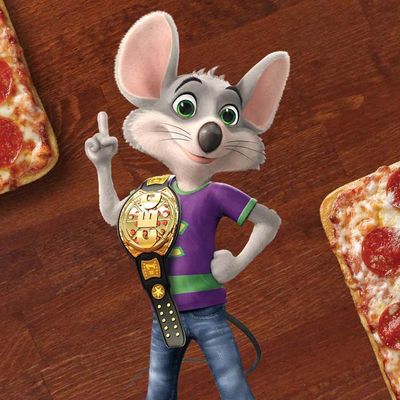
Chuck E. Cheese, that pit of nostalgia and video games and pizza and terrifying animatronic monstrosities, has a millennials problem. As Bloomberg’s Craig Giammona reported last week, the company is seeking to boost its flagging revenue by reaching out to the next generation of parental gatekeepers: young moms and dads. The company has some theories about how to do so, according to the head chef at the chain’s parent company. “Her kids know it’s a fun place to go, but millennial moms want to provide that great experience without sacrificing for themselves,” he explained of millennial moms. “Before she was a mom, she was going to places like Panera and those concepts. She wants something that fits into her millennial lifestyle.”
To appeal to this mysterious lifestyle — which, as Bloomberg explained, marketers are still trying to puzzle out — the chain is “remaking its pizza, improving the salad bar, and expanding its list of beer and wine” (in a recent blind taste test, the new pizza was rated even higher than Pizza Hut’s!).
These efforts are always interesting to watch in light of how vague and amorphous — and often meaningless — this millennials label is. As we see over and over again, whether the subject is human resources or dating or whatever else, millennials is a handy way to make commonsense observations about people sound fresh and new and important without really saying anything at all. It’s always been the case that parents and their kids like different foods, after all, and it’s always been the case that many people age out of drinking the cheapest beer (as Time noted in its own sympathetic write-up, the current options at Chuck E. Cheese are rather limited).
But think of the incentives here if you work for Chuck E. Cheese or its parent company and your job is to come up with a story about why sales are falling and how to reverse the slide. One possible story is that no one likes the food — especially now that people have more pizza options than ever — and that it’s getting increasingly difficult to get kids excited about playing video games at Chuck E. Cheese when they can do so at home. This wouldn’t be a fun thing to tell your bosses. What if, instead, it’s simply that the company hasn’t figured out these sphinxlike millennials, what with their strange and different “lifestyles” that orbit around “concepts” like “Panera”?
The latter story is a win-win for everyone involved: It sounds like a cutting-edge explanation of consumer behavior — even if it isn’t — and it posits that the problem isn’t the sort of big, terrifying economic or sociological forces that can doom a business model outright, but rather a simple matter of doing better market research.
What happens when someone outside the Chuck E. Cheese orbit analyzes the company’s problems? Back in 2013, industry analysts at the firm White Hutchinson tried to figure out Chuck E. Cheese’s sales problems. Here are a few of the issues they identified:
- “Kids getting older younger” — At a younger and younger age, kids are moving on from the sort of explicitly kids-oriented fare offered up by Chuck E. Cheese.
- “Digital Darwinism” — Yep, the video-game thing. Video games are everywhere, including on kids’ phones (or at least their parents’), so the idea of heading out for a night of playing video games has lost a bit of its luster.
- “Enriching play” — “Unlike Boomer moms, who saw their children’s play and learning as separate activities,” the authors write, “Gen-Y and Gen-X moms want their children to play and learn at the same time.” Kids don’t really learn anything at Chuck E. Cheese, other than that giant talking animals will haunt their dreams, and parents know that.
(All along, there’s also been a fixation with the rodent mascot’s choice of hat. Here’s White Hutchinson in 2013: “[Chuck E. Cheese] is making an attempt to counter this trend by updating their well know rodent mascot into a hip, electric guitar-playing rock star with an edgier look and bit more mischievous attitude … and no baseball cap.” And Bloomberg’s Giammona, just last week: “The company is even updating the look of its namesake character. In new imagery, Chuck E. Cheese looks less cartoonish and more like a computer-animated character. And gone is the backwards baseball cap.”)
If this diagnosis is correct, then the problem isn’t millennials — it’s that the entire model of what it means to take your kid out to have some fun is changing, slowly but inexorably. And according to White Hutchinson, Chuck E. Cheese’s revenue slide has been going on since 2004, which is long before the current vapid obsession with millennials took hold.
It’s easy, then, to see how this obsession with millennials and their preferences is self-perpetuating: Companies turn to understanding millennials as a lazy would-be panacea, which generates new (mostly bogus) theories about what millennials want, which are then covered by the media, which amplifies the discussion of what millennials want, which convinces companies to turn everything into a problem of understanding millennials, and so on. It’s an ouroboros made out of Panera baguettes and pop psychology and an anthropomorphic rat with no baseball cap on.




